法律英语学习:中国的侦查制度
司法考试课件:第十一章 侦查

• 3、勘验、检查
• (1)勘验、检查是指侦查人员对与犯罪有 关的场所、物品、人身、尸体进行勘查、 检验或检查,以发现和收集犯罪活动所遗 留的各种痕迹和物品的一种侦查活动。
• (2)勘验、检查的性质是一样的,只是对 象不同,勘验的对象是现场、物品和尸体, 检查的对象是活人的身体
• (6)讯问聋哑等犯罪嫌疑人的特殊要求
• 讯问聋哑犯罪嫌疑人,应当有通晓聋哑手势的人 参加并在讯问笔录上注明犯罪嫌疑人的聋哑情况 以及翻译人员的姓名、工作单位和职业。
• 讯问不通晓当地语言文字的犯罪嫌疑人,应当配 备翻译人员
• (7)讯问笔录的制作
• 讯问犯罪嫌疑人应当制作笔录。
• 讯问笔录应当交犯罪嫌疑人核对,对于没 有阅读能力的,应当向他宣读,如果记录 有遗漏或者差错的,犯罪嫌疑人可以提出 补充或者改正。
• (3)教育公民自觉遵守法律,积极同犯罪 行为作斗争
第二节 侦查行为
• 1、讯问犯罪嫌疑人 • (1)侦查人员依照法定程序以言词方式对犯罪嫌
疑人进行提问并要求回答的一种侦查活动 • (2)讯问犯罪嫌疑人应当由人民检察院或者公安
机关的侦查人员进行,人数不得少于2人 • (3)讯问的地点: • 犯罪嫌疑人被送交看守所羁押的,侦查人员对其
• (2)我国的侦查组织体系
• 双重性:一方面实行侦诉分离,侦查机关和起诉 机关分立;另一方面又具有一定的侦诉一体的特 征。例如自侦案件。
• 3、侦查的任务
• (1)收集证据、查明犯罪事实,查获犯罪 嫌疑人
• (2)保障无罪的人不受刑事追究,尊重和 保障人权,保障犯罪嫌疑人和其他诉讼参 与人的诉讼权利
6侦查制度
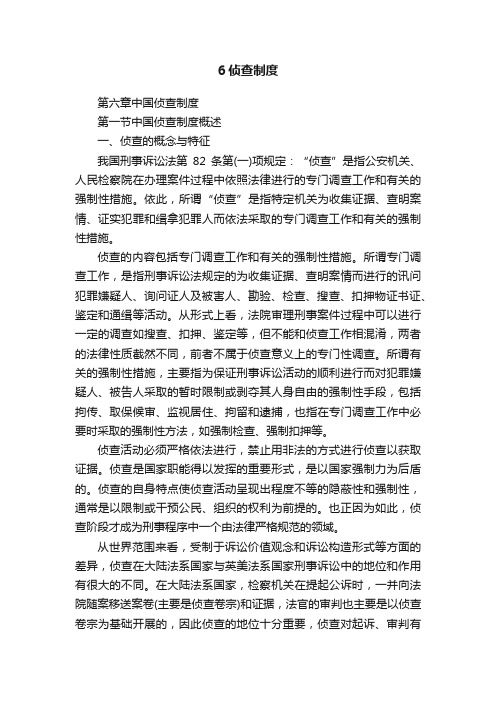
6侦查制度第六章中国侦查制度第一节中国侦查制度概述一、侦查的概念与特征我国刑事诉讼法第82条第(一)项规定:“侦查”是指公安机关、人民检察院在办理案件过程中依照法律进行的专门调查工作和有关的强制性措施。
依此,所谓“侦查”是指特定机关为收集证据、查明案情、证实犯罪和缉拿犯罪人而依法采取的专门调查工作和有关的强制性措施。
侦查的内容包括专门调查工作和有关的强制性措施。
所谓专门调查工作,是指刑事诉讼法规定的为收集证据、查明案情而进行的讯问犯罪嫌疑人、询问证人及被害人、勘验、检查、搜查、扣押物证书证、鉴定和通缉等活动。
从形式上看,法院审理刑事案件过程中可以进行一定的调查如搜查、扣押、鉴定等,但不能和侦查工作相混淆,两者的法律性质截然不同,前者不属于侦查意义上的专门性调查。
所谓有关的强制性措施,主要指为保证刑事诉讼活动的顺利进行而对犯罪嫌疑人、被告人采取的暂时限制或剥夺其人身自由的强制性手段,包括拘传、取保候审、监视居住、拘留和逮捕,也指在专门调查工作中必要时采取的强制性方法,如强制检查、强制扣押等。
侦查活动必须严格依法进行,禁止用非法的方式进行侦查以获取证据。
侦查是国家职能得以发挥的重要形式,是以国家强制力为后盾的。
侦查的自身特点使侦查活动呈现出程度不等的隐蔽性和强制性,通常是以限制或干预公民、组织的权利为前提的。
也正因为如此,侦查阶段才成为刑事程序中一个由法律严格规范的领域。
从世界范围来看,受制于诉讼价值观念和诉讼构造形式等方面的差异,侦查在大陆法系国家与英美法系国家刑事诉讼中的地位和作用有很大的不同。
在大陆法系国家,检察机关在提起公诉时,一并向法院随案移送案卷(主要是侦查卷宗)和证据,法官的审判也主要是以侦查卷宗为基础开展的,因此侦查的地位十分重要,侦查对起诉、审判有着重大的、实质性的影响。
而在英美法系国家,过去通常不把侦查视为严格意义上的刑事诉讼活动,只有起诉以后的活动才算是刑事诉讼活动。
现在尽管已经把侦查纳入广义的刑事诉讼范围,但侦查活动只是提起公诉所做的前期准备工作。
中美刑事侦查制度比较研究
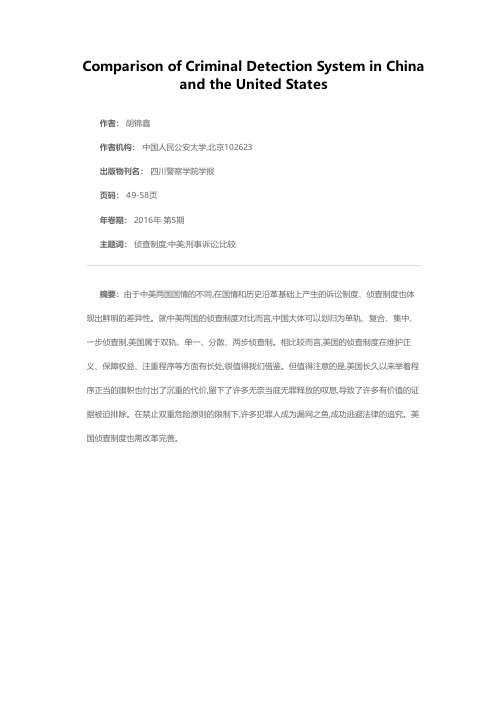
Comparison of Criminal Detection System in China
and the United States
作者: 胡锦鑫
作者机构: 中国人民公安大学,北京102623
出版物刊名: 四川警察学院学报
页码: 49-58页
年卷期: 2016年 第5期
主题词: 侦查制度;中美;刑事诉讼;比较
摘要:由于中美两国国情的不同,在国情和历史沿革基础上产生的诉讼制度、侦查制度也体现出鲜明的差异性。
就中美两国的侦查制度对比而言,中国大体可以划归为单轨、复合、集中、一步侦查制,美国属于双轨、单一、分散、两步侦查制。
相比较而言,美国的侦查制度在维护正义、保障权益、注重程序等方面有长处,很值得我们借鉴。
但值得注意的是,美国长久以来举着程序正当的旗帜也付出了沉重的代价,留下了许多无奈当庭无罪释放的叹息,导致了许多有价值的证据被迫排除。
在禁止双重危险原则的限制下,许多犯罪人成为漏网之鱼,成功逃避法律的追究。
美国侦查制度也需改革完善。
刑事侦查学中英对照
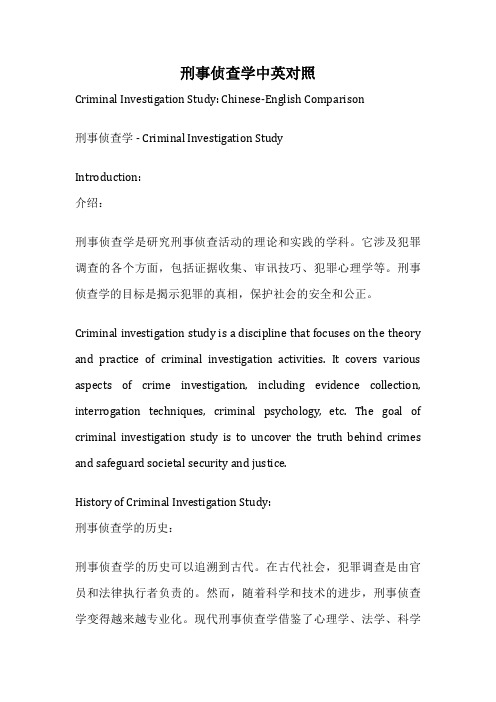
刑事侦查学中英对照Criminal Investigation Study: Chinese-English Comparison刑事侦查学 - Criminal Investigation StudyIntroduction:介绍:刑事侦查学是研究刑事侦查活动的理论和实践的学科。
它涉及犯罪调查的各个方面,包括证据收集、审讯技巧、犯罪心理学等。
刑事侦查学的目标是揭示犯罪的真相,保护社会的安全和公正。
Criminal investigation study is a discipline that focuses on the theory and practice of criminal investigation activities. It covers various aspects of crime investigation, including evidence collection, interrogation techniques, criminal psychology, etc. The goal of criminal investigation study is to uncover the truth behind crimes and safeguard societal security and justice.History of Criminal Investigation Study:刑事侦查学的历史:刑事侦查学的历史可以追溯到古代。
在古代社会,犯罪调查是由官员和法律执行者负责的。
然而,随着科学和技术的进步,刑事侦查学变得越来越专业化。
现代刑事侦查学借鉴了心理学、法学、科学和技术等多个学科的知识,使犯罪调查变得更加科学和高效。
The history of criminal investigation study can be traced back to ancient times. In ancient societies, crime investigation was carried out by officials and law enforcers. However, with the advancement of science and technology, criminal investigation study became more specialized. Modern criminal investigation study incorporates knowledge from various disciplines such as psychology, law, science, and technology, making crime investigation more scientific and efficient.Key Concepts in Criminal Investigation Study:刑事侦查学的关键概念:1. Evidence: Evidence is crucial in criminal investigation as it provides proof or support for the existence or non-existence of a fact. It can be physical, testimonial, or documentary.2. Crime Scene: The crime scene refers to the location where a crime has been committed. It is important for investigators to properly secure and process the crime scene to preserve evidence.3. Interrogation: Interrogation is the process of questioning suspects, witnesses, or persons of interest in order to obtain information relevant to the investigation. Effective interrogation techniques areessential in obtaining reliable information.4. Profiling: Profiling is the process of analyzing crime scene evidence and behavior patterns to create a psychological and behavioral profile of the perpetrator. It helps investigators narrow down the list of suspects.5. Forensic Science: Forensic science involves the application of scientific techniques to analyze physical evidence. It includes disciplines such as DNA analysis, fingerprint identification, ballistics, etc.Conclusion:结论:刑事侦查学在犯罪调查中发挥着重要的作用。
法律英语复习中国的检查制度
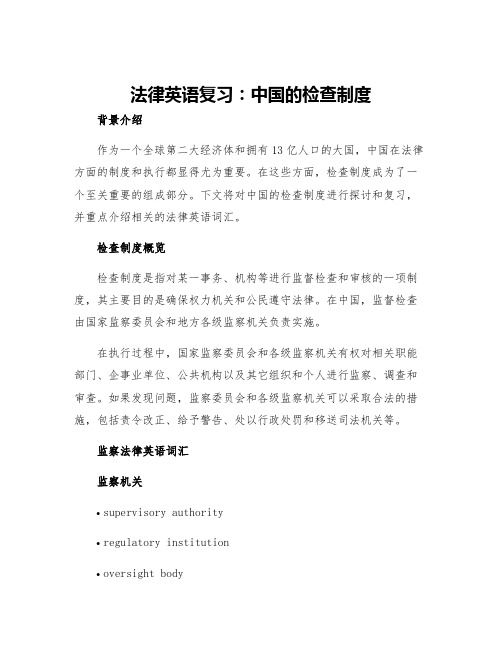
法律英语复习:中国的检查制度背景介绍作为一个全球第二大经济体和拥有13亿人口的大国,中国在法律方面的制度和执行都显得尤为重要。
在这些方面,检查制度成为了一个至关重要的组成部分。
下文将对中国的检查制度进行探讨和复习,并重点介绍相关的法律英语词汇。
检查制度概览检查制度是指对某一事务、机构等进行监督检查和审核的一项制度,其主要目的是确保权力机关和公民遵守法律。
在中国,监督检查由国家监察委员会和地方各级监察机关负责实施。
在执行过程中,国家监察委员会和各级监察机关有权对相关职能部门、企事业单位、公共机构以及其它组织和个人进行监察、调查和审查。
如果发现问题,监察委员会和各级监察机关可以采取合法的措施,包括责令改正、给予警告、处以行政处罚和移送司法机关等。
监察法律英语词汇监察机关•supervisory authority•regulatory institution•oversight body监察职责•oversight function •supervisory responsibility •regulatory duty监察对象•subject under surveillance •entity under inspection •object of oversight监察措施•corrective action•warning•administrative sanction •referral to judicial authorities 国家监察委员会•National Supervisory Commission •NSC视察•inspection•review•examination监察制度的重要性监察制度是中国法律体系的重要组成部分,其重要性不言而喻。
作为一项权力运行的重要机制,监察制度旨在确保政府公正、廉洁和透明,满足人民对政府合法权力的保障要求,维护社会稳定和公共利益。
同时,监察制度也是促进政府改革和内部治理的有效途径。
刑事侦查学侦查概念

“CI” in the science of the criminal investigation
在刑事诉讼活动中,侦查主体为查明案情, 搜集犯罪证据和材料,证实和抓获犯罪嫌 疑人而依法采取的一系列专门调查方法和 强制措施一种诉讼活动。 1、the criminal cases; 2、evidence; 3、suspect;
(二)侦查学上的侦查概念(P3)
广义的侦查,是指在刑事诉讼活动中,侦查主体为查明案情, 收集犯罪证据材料,证实犯罪和抓获犯罪嫌疑人,追缴赃 款赃物,为公诉活动奠定基础而依法采取的一系列专门调 查方法和强制措施的一种诉讼行为。 狭义上的侦查,是指公安机关、人民检察院在办理刑事案件 过程中,依照法律进行的专门调查工作。
三、侦查概念的构造分析 (P4)
(一)侦查主体是国家专门刑事司法机关 (二)侦查客体是已立案的刑事罪案 (三)侦查内容是一种专门调查活动 (四)侦查本质是一种带强制力的诉讼活动
四、侦查与侦察的概念界分(P6)
首先,在我国刑事司法的特定制度语境中,“侦察”被“侦查”程序所 包含; 其次,“侦察”与“侦查”是不同社会领域、学术领域中的不同术语。 再次,侦查指的是“在刑事诉讼中为收集证据、审查证据、确定犯罪事 实、查明犯罪人而进行的专门调查工作和有关的强制措施。侦察, “是‘军事侦察’的简称。
复次, “侦查”与“侦察”的行为实施依据不同。
最后,两种活动所获资料的法律地位不同。
第一章 绪论
第一节 侦查的概念
一、“侦查”概念的确定(P1) “公诉程序前由刑事司法机关调查犯罪案件 的刑事司法活动”的用语“犯罪侦查”、“刑事 侦察”、“刑事侦查”、“刑事犯罪侦查”、 “侦察”、“侦查” 。
二、侦查概念的几个层次 (P2)
第三章 侦查制度
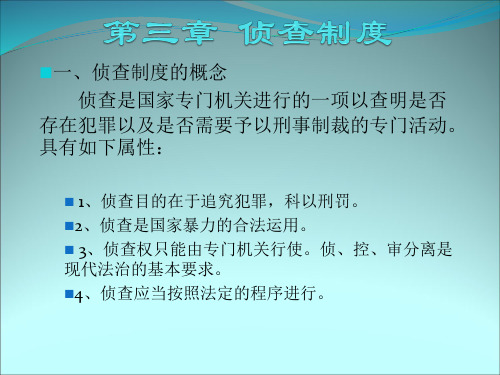
一、侦查的概念
5、侦查是刑事诉讼的第一个阶段。
审 查 起 诉 阶 段
侦 查 阶 段
审 判 阶 段
执 行 阶 段
侦查机关
人民检察院
人民法院
执行机构
二、中国侦查制度的特征
1、侦查机关多元
二、中国侦查制度的特征
2、侦查手段丰富。
讯问犯罪嫌疑人 侦查实验 勘验、检查 搜查
通缉
侦查机关
辨认
鉴定 扣押物证、书证
四、侦查的主要制度
(三)强制措施制度
3、监视居住:监视居住和取保候审的适用范围相同,
但只能择一适用。监视居住期间不得超过6个月 被监视居住的人应履行以下义务:
(1)未经执行机关的批准不得离开住处,无固定住处的,未经 批准不得离开指定的居所。 (2)未经执行机关的批准不得会见他人。这里的“他人”是指 与被监视居住人共同居住的家庭成员及其聘请律师以外的其他人。 (3)在传讯的时候及时到案。 (4)不得以任何形式干扰证人作证。 (5)不得毁灭、伪造证据或者串供。
四、侦查的主要制度
(三)强制措施制度
2、取保候审 5)对被拘留的犯罪嫌疑人、被告人,需要逮捕而证 据尚不符合逮捕条件的; 6)提起批准逮捕后,检察机关不批准逮捕需要复议、 复核的; 7)移送起诉后,检察机关决定不起诉需要复议、复 核的; 8)持有有效护照和其他有效出入境证件,可能出境 逃避侦查但不需要逮捕的。
四、侦查的主要制度
(二)侦查程序制度
3、勘验、检查 勘验的对象是有关场所、物品和尸体;检查的对象是活 的人体,检查妇女身体应由女工作人员或者医师进行
4、搜查 (1)搜查的对象是可能隐藏犯罪嫌疑人或者罪证的人身、 物品、住所和其他有关场所 (2)2名以上侦查员实施 (3)应当出示搜查证,但在执行逮捕、拘留时,遇有紧急 情况无证也可搜查 (4)搜查妇女身体应当由女工作人员进行
侦查工作制度包括哪些
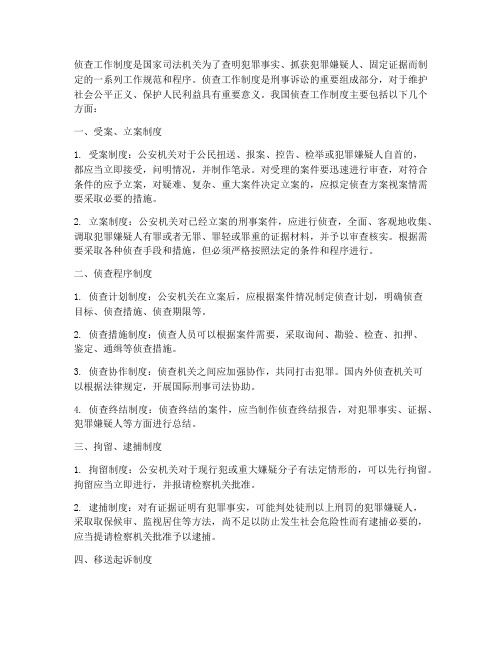
侦查工作制度是国家司法机关为了查明犯罪事实、抓获犯罪嫌疑人、固定证据而制定的一系列工作规范和程序。
侦查工作制度是刑事诉讼的重要组成部分,对于维护社会公平正义、保护人民利益具有重要意义。
我国侦查工作制度主要包括以下几个方面:一、受案、立案制度1. 受案制度:公安机关对于公民扭送、报案、控告、检举或犯罪嫌疑人自首的,都应当立即接受,问明情况,并制作笔录。
对受理的案件要迅速进行审查,对符合条件的应予立案,对疑难、复杂、重大案件决定立案的,应拟定侦查方案视案情需要采取必要的措施。
2. 立案制度:公安机关对已经立案的刑事案件,应进行侦查,全面、客观地收集、调取犯罪嫌疑人有罪或者无罪、罪轻或罪重的证据材料,并予以审查核实。
根据需要采取各种侦查手段和措施,但必须严格按照法定的条件和程序进行。
二、侦查程序制度1. 侦查计划制度:公安机关在立案后,应根据案件情况制定侦查计划,明确侦查目标、侦查措施、侦查期限等。
2. 侦查措施制度:侦查人员可以根据案件需要,采取询问、勘验、检查、扣押、鉴定、通缉等侦查措施。
3. 侦查协作制度:侦查机关之间应加强协作,共同打击犯罪。
国内外侦查机关可以根据法律规定,开展国际刑事司法协助。
4. 侦查终结制度:侦查终结的案件,应当制作侦查终结报告,对犯罪事实、证据、犯罪嫌疑人等方面进行总结。
三、拘留、逮捕制度1. 拘留制度:公安机关对于现行犯或重大嫌疑分子有法定情形的,可以先行拘留。
拘留应当立即进行,并报请检察机关批准。
2. 逮捕制度:对有证据证明有犯罪事实,可能判处徒刑以上刑罚的犯罪嫌疑人,采取取保候审、监视居住等方法,尚不足以防止发生社会危险性而有逮捕必要的,应当提请检察机关批准予以逮捕。
四、移送起诉制度公安机关侦查终结的案件,对于犯罪事实清楚,证据确实、充分,犯罪性质和罪名认定正确,法律手续完备,依法应当追究刑事责任的,应当移送同级人民检察院审查决定是否起诉。
五、证据制度1. 证据收集制度:侦查人员必须严格依照法定程序,收集能够证实犯罪嫌疑人有罪或者无罪,犯罪情节轻重的各种证据。
第二章:侦查制度
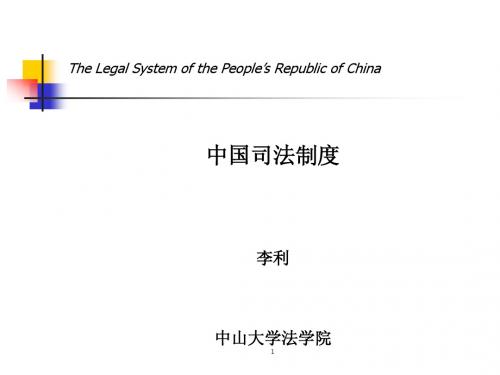
第一节 侦查制度概述
侦查程序:就是法律规定的侦查机关行使侦查权,完 成侦查任务的诉讼程序。
在我国,刑事案件的诉讼程序分为立案、侦查、起诉、 审判和执行五个阶段。公诉案件不经过侦查,起诉就 无法进行。只有通过侦查活动,收集确实、充分的证 据,查明犯罪事实,查获犯罪嫌疑人才能进入起诉阶 段。 长期以来,我国将刑事案件的侦查分为前期的侦查和 后期的预审两个阶段。
第一节 侦查制度概述
例如,我国《宪法》第135条规定:“人民法院、人民检 察院和公安机关办理刑事案件,应当分工负责、互相配 合、互相制约,以保证准确有效地执行法律。”这表明 立法者已明确将公安机关办理刑事案件的活动与检察院 法院的刑事诉讼活动作为了一整体。同时,根据我国有 关立法和国际条约的规定,公、检、法三机关在办理刑 事案件过程中都可以向其他国家有关机关请求提供司法 协助,从这个角度来说,公安机关履行的侦查职能是司 法职能的一部分。再次,我国《刑法》第 94 条规定: “本法所称的司法人员,是指有侦查、检察、审判、监 管职责的工作人员。”由此可推知,立法者已经将侦查 人员视为侦查人员的一部分了。
第一节 侦查制度概述
3.侦查行为是法律规定的侦查措施 《刑事诉讼法》第一百零六条第一项规定:“‘侦查’ 是指公安机关、人民检察院在办理案件过程中,依照 法律进行的专门调查工作和有关的强制性措施”。
“专门的调查工作”是指刑事诉讼法所规定的为收集 证据、查明犯罪而进行的侦查措施。 “有关的强制性措施”是指刑事诉讼法所规定的为收 集证据、查明犯罪和查获犯罪嫌疑人而采取的限制、 剥夺人身自由或对人身、财物进行强制的措施。
第一节 侦查制度概述
侦查权:法律赋予侦查机关对特定案件的侦查职权, 与刑事起诉权、审判权、执行权共同构成刑事司法权。 侦查权具有以下特征: 一是法定性,非经法律授权,任何单位和个人不得行 使侦查权。
论我国侦查制度

论我国侦查制度引言:侦查制度作为维护国家安全和社会稳定的重要一环,对于法治国家的建设和司法公正有着至关重要的作用。
我国侦查制度在过去几十年来经历了持续的改革和完善,取得了显著的成就。
本文将就我国侦查制度的历史背景、法律基础、组织架构、程序规定和改革发展等方面进行探讨和分析。
一、历史背景我国侦查制度的发展可以追溯到古代的侦查活动。
古代中国强调“知彼知己,百战不殆”,侦查活动在战争中起到了重要的作用。
然而,现代的侦查制度是在我国新中国成立后才逐渐形成的。
特别是改革开放以来,我国侦查制度逐渐建立并得到了进一步的完善。
二、法律基础我国侦查制度的法律基础主要包括《中华人民共和国刑事诉讼法》、《中华人民共和国监察法》等。
这些法律明确了侦查机关的职责和权限,规定了侦查活动的程序和要求,为侦查工作的开展提供了法律保障。
三、组织架构我国侦查制度的组织架构包括公安机关、国家安全机关和监察机关等。
其中,公安机关负责侦查刑事案件,国家安全机关负责侦查涉及国家安全的案件,监察机关负责侦查职务犯罪和行政违法行为等。
这些机关分工协作,形成了相互配合的侦查体系。
四、程序规定我国侦查制度规定了一系列的程序要求,其中包括侦查许可的原则、侦查取证的方式、侦查活动的时限等。
侦查人员在开展侦查活动时必须遵守这些程序规定,确保侦查工作的合法性和公正性。
五、改革发展我国侦查制度的改革发展始终与社会现实和司法改革紧密相连。
近年来,在司法领域深化改革的推动下,我国侦查制度取得了一系列的创新和进步。
例如,依法采取人证物证相结合的侦查取证方式,加强对侦查活动的监督和审查,提高了侦查工作的科学性和效率。
结论:我国侦查制度在历史发展中逐渐完善,并在改革发展过程中取得了显著的成就。
然而,侦查制度仍面临一些挑战和问题,如如何保障侦查活动的合法性和公正性,如何加强对侦查人员的培训和监督等。
通过进一步完善侦查制度,提高侦查工作的科学性和效率,将有助于维护国家安全和社会稳定,推进法治国家的建设和司法公正。
第十一周(侦查行为)
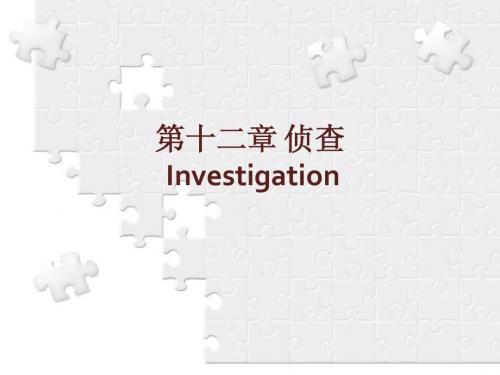
侦查人员对与犯罪有关的场所、物品、尸体、人身进 行勘查和检验,以发现、收集和固定犯罪活动所遗留下 来的各种痕迹和物品的一种侦查行为 1、现场勘验 2、物证检验 3、尸体检验(对死因不明的尸体,公安机关有权决定解 剖,并通知死者家属到场) 4、人身检查(指纹信息、采集血液、尿液等生物样本) 5、侦查实验(《刑事诉讼法》133条……经侦查机关负责 人批准,可以进行侦查实验,侦查实验的情况应当写成 笔录,由参加实验的人签名或者盖章……)
第一节 侦查概述 Brief introduction of investigation
一、概念 侦查机关在办理刑事案件过程中,依照法 律进行的专门调查工作和采取的有关强制 措施。
第一节 侦查概述 Brief introduction of investigation
二、特征 1、享有侦查权的主体具有法定性 主要是公安机关和人民检察院(此外还包括国 安、军保、监狱等) 2、侦查活动的内容具有特定性 专门的调查工作和采取的有关强制措施 3、侦查活动必须严格依照法律进行 侦查法定主义
第二节 侦查行为 act of investigation
第一节 侦查概述 Brief introduction of investigation
三、侦查组织体系和侦查模式 1、组织体系: 侦诉一体(德、法)、 侦诉分离(美、英) 2、模式: 职权主义、当事人主义
思考:我国的侦查组织体系和侦查模式
第一节 侦查概述 Brief introduction of investigation
刑事侦查基本工作制度

刑事侦查基本工作制度一、引言刑事侦查工作是依法进行犯罪侦查、证据收集、犯罪嫌疑人抓捕等活动的过程,是司法程序的重要组成部分。
为了确保刑事侦查工作的公正、公平、高效,各国都建立了相应的刑事侦查基本工作制度。
本文将介绍我国刑事侦查基本工作制度的主要内容及其特点。
二、我国刑事侦查基本工作制度1. 侦查机构我国刑事侦查基本工作制度主要由公安机关、国家安全机关、人民检察院和人民法院等侦查机构共同实施。
其中,公安机关是刑事侦查工作的主力军,负责侦查各类刑事案件;国家安全机关负责侦查危害国家安全的案件;人民检察院负责侦查职务犯罪案件;人民法院负责审理刑事案件。
2. 侦查权限侦查机构在开展刑事侦查工作时,应当依法行使侦查权。
侦查权包括侦查措施的采取、侦查取证、强制措施的适用等。
侦查机构在侦查过程中,有权依法询问犯罪嫌疑人、证人、鉴定人等,查阅、提取、扣押涉案物品和资料,采取技术侦查措施等。
3. 侦查程序刑事侦查程序是保障侦查工作公正、公平、高效的重要环节。
侦查程序主要包括:(1)报案、控告、举报的受理;(2)立案侦查;(3)侦查措施的采取;(4)侦查终结;(5)案件移送。
4. 侦查取证侦查取证是刑事侦查工作的核心任务。
侦查机构在侦查过程中,应当全面、客观、公正地收集、固定、提取、鉴定与案件有关的证据。
侦查取证工作应当遵循合法、合规、科学、公正的原则,确保证据的真实性、合法性和可信度。
5. 强制措施刑事侦查过程中,为保证侦查工作的顺利进行,侦查机构可以依法采取强制措施。
强制措施包括:拘传、取保候审、监视居住、拘留、逮捕等。
采取强制措施应当遵循合法、适当、及时、必要的原则,保障嫌疑人的合法权益。
6. 侦查协作侦查协作是刑事侦查工作中不可或缺的一环。
侦查机构之间应当加强协作,共同打击犯罪。
侦查协作主要包括:信息共享、线索通报、侦查措施的配合、案件移送等。
7. 侦查监督侦查监督是对侦查机构侦查活动的合法性、合规性进行监督的制度。
侦查措施的相关英语作文
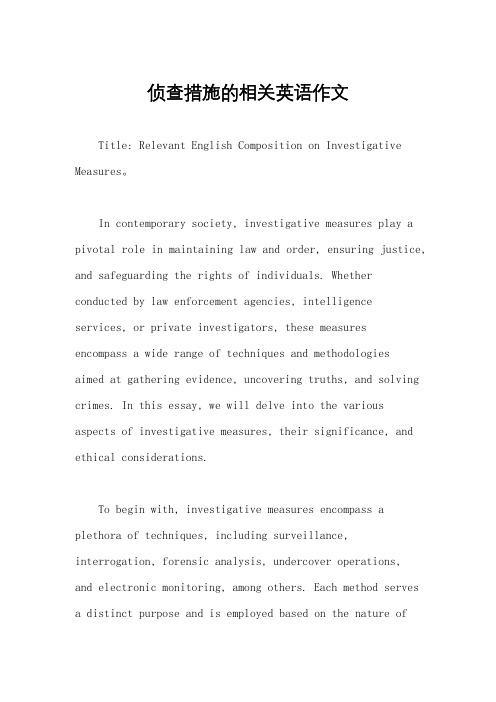
侦查措施的相关英语作文Title: Relevant English Composition on Investigative Measures。
In contemporary society, investigative measures play a pivotal role in maintaining law and order, ensuring justice, and safeguarding the rights of individuals. Whether conducted by law enforcement agencies, intelligence services, or private investigators, these measures encompass a wide range of techniques and methodologiesaimed at gathering evidence, uncovering truths, and solving crimes. In this essay, we will delve into the various aspects of investigative measures, their significance, and ethical considerations.To begin with, investigative measures encompass a plethora of techniques, including surveillance, interrogation, forensic analysis, undercover operations,and electronic monitoring, among others. Each method serves a distinct purpose and is employed based on the nature ofthe case, available resources, and legal constraints. Surveillance, for instance, involves the covert observation of individuals or groups suspected of engaging in criminal activities. This may entail physical surveillance by trained operatives or the use of sophisticated technology such as CCTV cameras and drones.Interrogation is another crucial investigative measure employed to extract information from suspects, witnesses, or persons of interest. It requires skilled interrogators who employ various psychological tactics to elicit truthful responses while adhering to legal guidelines regarding coercion and the rights of the interviewee. Forensic analysis, on the other hand, involves the scientific examination of physical evidence such as DNA, fingerprints, and ballistic data to establish links between suspects and crime scenes.Undercover operations represent a clandestine approach to gathering intelligence and evidence by embedding operatives within criminal organizations or target groups. This method often requires meticulous planning, riskassessment, and adherence to strict protocols to ensure the safety of undercover agents and the integrity of gathered evidence. Electronic monitoring, including the interception of communications and the use of tracking devices, has become increasingly prevalent in the digital age, presenting new challenges and ethical dilemmas regarding privacy rights and legal oversight.The significance of investigative measures cannot be overstated, as they serve as the cornerstone of criminal justice systems worldwide. By gathering evidence and uncovering facts, investigators play a vital role in ensuring that perpetrators are held accountable for their actions and that innocent individuals are exonerated. Moreover, investigative measures contribute to the prevention of future crimes by deterring potential offenders and dismantling criminal networks through targeted enforcement actions.However, the use of investigative measures is not without its ethical considerations and potential pitfalls. One of the primary concerns relates to the balance betweenindividual rights and the need for effective law enforcement. While investigative measures are essential for combating crime, they must be conducted within the boundaries of legal frameworks and respect fundamental human rights such as privacy, due process, and the presumption of innocence.Moreover, the potential for abuse and misuse of investigative measures underscores the importance of robust oversight mechanisms and accountability measures. This includes judicial review of surveillance warrants, independent oversight bodies tasked with monitoring investigative activities, and transparency regarding the use of emerging technologies with implications for privacy and civil liberties.In conclusion, investigative measures represent a critical component of modern law enforcement and intelligence-gathering efforts. From surveillance and interrogation to forensic analysis and undercover operations, these techniques play a vital role in uncovering truths, solving crimes, and ensuring justice.However, their use must be guided by ethical principles, legal frameworks, and respect for individual rights to maintain public trust and uphold the rule of law in society.。
中国的侦查制度(英)
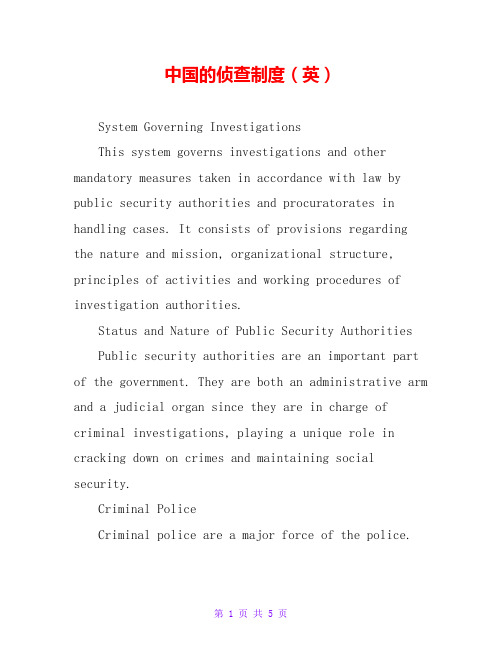
中国的侦查制度(英)System Governing InvestigationsThis system governs investigations and other mandatory measures taken in accordance with law by public security authorities and procuratorates in handling cases. It consists of provisions regarding the nature and mission, organizational structure, principles of activities and working procedures of investigation authorities.Status and Nature of Public Security AuthoritiesPublic security authorities are an important part of the government. They are both an administrative arm and a judicial organ since they are in charge of criminal investigations, playing a unique role in cracking down on crimes and maintaining social security.Criminal PoliceCriminal police are a major force of the police.1. Qualification Requirements for Investigative OfficersArticle 26 of the People's Police Law providesthat investigative officers should meet the following conditions:Citizens at least 18 years of age;Support the Constitution of the People's Republicof China;In good political, professional and moral standing;In good health;Have at least a senior high school education;Willing to be a policeman.Persons who have the following records should not be a member of the police:Having received criminal penalty for committing a crime;Having been dismissed from public office.2. PromotionsPolice are divided into 13 ranks in five categories:Police Commissioner and Deputy Commissioner;Police Superintendent Level 1, 2 and 3;Police Inspector Level 1, 2 and 3;Police Sergeant Level 1, 2 and 3;Police Constable Level 1 and 2.The Ministry of Public Security supervises the ranking and promotions of the police.Investigations1. Acceptance and Establishment of CasesPublic security authorities should immediately accept, inquire about, take notes of and hear cases of suspects turned in, reported or brought to the police by citizens or suspects who turn themselves in. Those that meet conditions should be accepted and filed as a case and for complicated and material cases, an investigation plan and, if necessary, necessary measures have to be taken.2. Procedures for Criminal InvestigationsFor criminal cases that already been filed withthe police, investigations should be launched for a thorough and impartial collection of evidence that may determine whether the suspect is guilty or innocentand, if guilty, whether it is a felon or a misdemeanor. Depending on actual needs, various detective means and measures will be taken in strict compliance with statutory procedures.3. Procedures for Detentions and ArrestsPublic security authorities may proceed to detain criminals caught in the act or material suspects in accordance with statutory procedures; they may also seek approval from procuratorates for an arrestwarrant for suspects for whom sufficient evidence of incrimination exists and a sentence is likely, and for whom measures such as obtaining a guarantor in anticipation of trial out of custody and surveillance of residence is insufficient for ensuring social security and order.4.Procedures for Case Transfer and ProsecutionCases concluded by public security authorities for which the facts are clearly established, evidence is verified and sufficient, the nature of crime and name of felony correctly defined, legal procedures completed and for which criminal liabilities should beprosecuted, should be transferred to the procuratorate at the same level to determine whether public prosecution is warranted.5. Procedures for Evidence GatheringDetectives should strictly follow statutory procedures in collecting all kinds of evidence that can prove whether a suspect is guilty or not, or how serious the felony is. Extortion of confession through torture and collecting evidence through threat, inducement, deception or other illegal means are strictly forbidden.。
法律词汇:侦查和执行篇
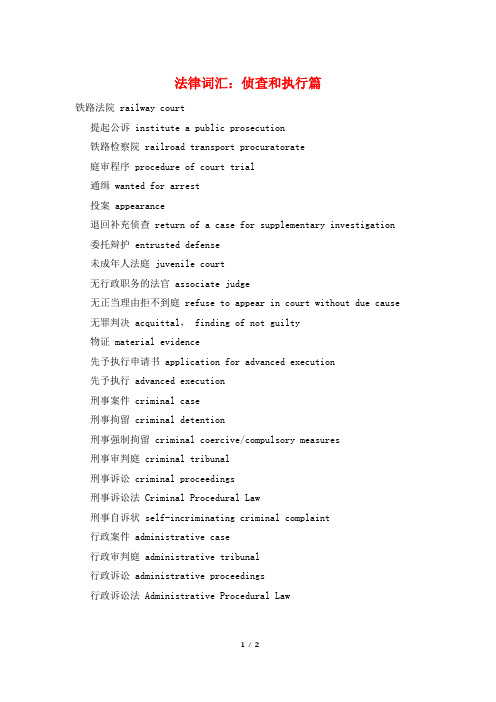
法律词汇:侦查和执行篇铁路法院 railway court提起公诉 institute a public prosecution铁路检察院 railroad transport procuratorate庭审程序 procedure of court trial通缉 wanted for arrest投案 appearance退回补充侦查 return of a case for supplementary investigation 委托辩护 entrusted defense未成年人法庭 juvenile court无行政职务的法官 associate judge无正当理由拒不到庭 refuse to appear in court without due cause 无罪判决 acquittal, finding of not guilty物证 material evidence先予执行申请书 application for advanced execution先予执行 advanced execution刑事案件 criminal case刑事拘留 criminal detention刑事强制拘留 criminal coercive/compulsory measures刑事审判庭 criminal tribunal刑事诉讼 criminal proceedings刑事诉讼法 Criminal Procedural Law刑事自诉状 self-incriminating criminal complaint行政案件 administrative case行政审判庭 administrative tribunal行政诉讼 administrative proceedings行政诉讼法 Administrative Procedural Law宣告失踪、宣告死亡案件 cases concerning the declaration of disappearance and death宣判笔录 record of rendition of judgement选民资格案件 cases concerning qualifications of voters 询问证人 inquire/question a witness训诫 reprimand讯问笔录 record of interrogation询问犯罪嫌疑人 interrogate criminal suspect。
法律英语在检察工作中的运用
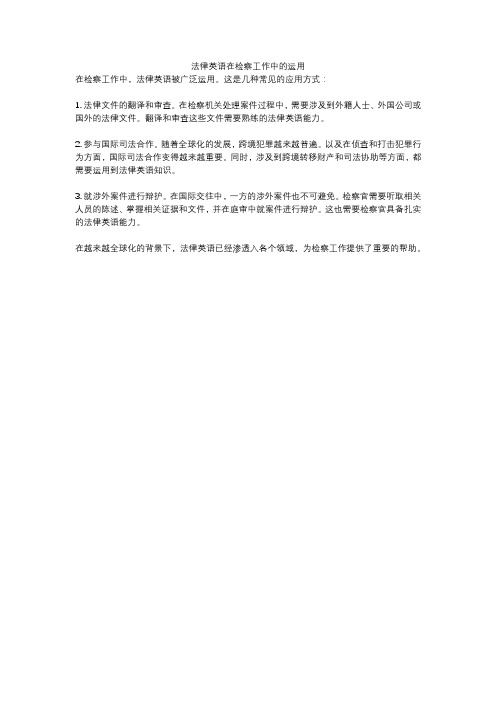
法律英语在检察工作中的运用
在检察工作中,法律英语被广泛运用。
这是几种常见的应用方式:
1. 法律文件的翻译和审查。
在检察机关处理案件过程中,需要涉及到外籍人士、外国公司或国外的法律文件。
翻译和审查这些文件需要熟练的法律英语能力。
2. 参与国际司法合作。
随着全球化的发展,跨境犯罪越来越普遍。
以及在侦查和打击犯罪行为方面,国际司法合作变得越来越重要。
同时,涉及到跨境转移财产和司法协助等方面,都需要运用到法律英语知识。
3. 就涉外案件进行辩护。
在国际交往中,一方的涉外案件也不可避免。
检察官需要听取相关人员的陈述、掌握相关证据和文件,并在庭审中就案件进行辩护。
这也需要检察官具备扎实的法律英语能力。
在越来越全球化的背景下,法律英语已经渗透入各个领域,为检察工作提供了重要的帮助。
法律英语复习:中国的检查制度
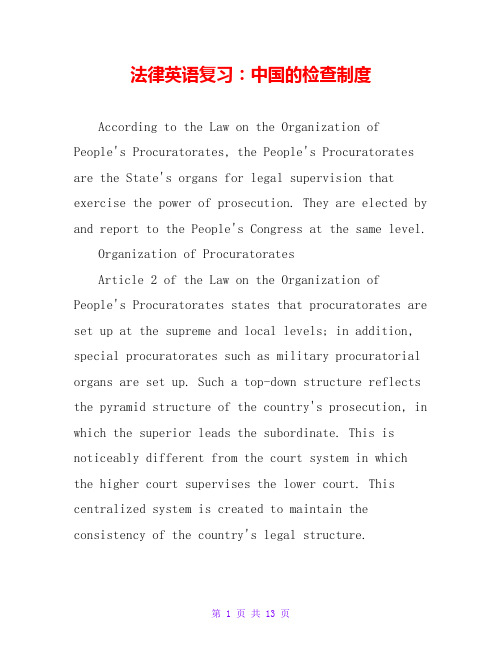
法律英语复习:中国的检查制度According to the Law on the Organization ofPeople's Procuratorates, the People's Procuratorates are the State's organs for legal supervision that exercise the power of prosecution. They are elected by and report to the People's Congress at the same level.Organization of ProcuratoratesArticle 2 of the Law on the Organization ofPeople's Procuratorates states that procuratorates are set up at the supreme and local levels; in addition, special procuratorates such as military procuratorial organs are set up. Such a top-down structure reflects the pyramid structure of the country's prosecution, in which the superior leads the subordinate. This is noticeably different from the court system in which the higher court supervises the lower court. This centralized system is created to maintain the consistency of the country's legal structure.The Supreme People's Procuratorate leads local and special procuratorates. Local means provincial, autonomous regional and municipal procuratorates and their branches, as well as procuratorates at the autonomous prefecture/cities directly under provincial governments, county, city, autonomous city and urban district levels. Special procuratorates include military and railway transportation prosecution. Procuratorates are established at levels corresponding to those of courts so that cases can be prosecuted in accordance with legal procedures.Responsibilities of ProcuratoratesAccording to the Law on the Organization ofPeople's Procuratorates and other related laws, procuratorates exercise the following powers: Exercise the power of prosecution on cases of treason, separatism and major crimes seriously hindering the uniform implementation of the state's policies, laws, writs, administrative decrees;Investigate criminal cases they directly handle;Review cases investigated by public security and state security authorities to decide if arrests, prosecutions are warranted; supervise the legality of such investigations;Initiate public prosecution and support public prosecution for criminal cases; supervise the legality of trials conducted by courts;Supervise the rulings and judgments on criminal cases and the legality of activities of jails, detention centers and reform-through-labor institutions;Supervise civil and administrative trials of courts.Organizational Structure of ProcuratoratesOrganizationally, procuratorates are composed of procuratorial committees and other specialized departments.1. Procuratorial CommitteeThe chief prosecutor of a procuratorate oversees the day-to-day operation of procuratorates. Clause 2, Article 3 of the Law on the Organization of People'sProcuratorates states that People's Procuratorates at all levels should establish a Procuratorial Committee and a democratic centralization system should be implemented. The committee should, under the leadership of the chief prosecutor, deliberate on major cases and other major issues. Should the chief prosecutor disagree with the decision of the majority of the committee members, he or she may refer the issue to the People's Congress at the same level for adjudication.2. Working BodyInternally, working bodies are created within each procuratorate. These include prosecutors for criminal, economic, disciplinary, jails, and civil and administrative cases. In particular, procuratorates have set up anti-corruption bureaus and reporting centers that fight embezzlement, bribery, dereliction and infringements of rights through collaboration with the masses.System of ProsecutorsThis system aims at managing prosecutors who, in accordance with laws, exercise the state power of prosecution at procuratorates. It consists of rules specifying the responsibilities, rights and obligations, qualifications, appointments and removals, examination, training, awards and penalties, salaryand compensation, resignation, and retirement of prosecutors. The Prosecutors Law was adopted on February 28, xx at the 12th session of the Standing Committee of the Eighth National People's Congress. That law went into force on July 1, xx.1. Qualifications of ProsecutorsProsecutors include chief prosecutor and deputy prosecutor of People's Procuratorates at all levels, members of the Procuratorial Committee, prosecutorsand assistant prosecutors. Prosecutors as a whole must meet the following qualifications:Be a citizen of the People's Republic of China;Be at least 23 years of age;Support the Constitution of the People's Republicof China;Be in political, professional and moral standing;Be in good health;A graduate of law from an institution of higher learning, or a non-law graduate from an institution of higher learning with in-depth knowledge of law, with two years of working experience; or holders of a bachelor's degree in law with a full year of working experience; those holding a Master's or Ph.D. degreein law are not subject to the working-experience limit described above.Those that have been penalized for crimes or have been dismissed from their public offices cannot be elected judges.Prosecutors obtain their qualifications in two ways:Through qualification examinations. Open examinations are administered regularly by the Supreme People's Procuratorate to recruit junior and assistant prosecutors. Chinese citizens with a three-year college education are eligible for the examination. Those who have passed the examination and are deemedas being in good political and ethical standing will be qualified as prosecutors and awarded a Certificate of Qualifications for Prosecutor;Through training and tests.Prosecutors and prosecution personnel can be disqualified for any of the following reasons: Resignation approved;Dismissed by procuratorial bodies;Removal of name from roll;Removal from office as a disciplinary penalty;Removal from position;Criminally penalized;Other reasons incompatible with the position of prosecutor.2. System for Appointment and Removal of ProsecutorsThe chief prosecutor is elected and removed by the People's Congress at the same level, but the appointment and removal of local chief prosecutors have to be reported to the chief prosecutor of higher procuratorates who, in turn, will submit theappointments and removals to the Standing Committee of the People's Congress at the same level for approval.The appointment and removal of the deputy chief prosecutor, members of the Procuratorial Committee and prosecutors must be submitted to the Standing Committee of the People's Congress at the same level, but the appointment and removal of assistant prosecutors can be approved by the chief prosecutor.3. Promotions, Awards and Penalties of ProsecutorsProsecutors are promoted in two ways: regular promotions and selective promotions.Prosecutors are divided into 12 ranks, with the highest being the Chief Prosecutor of the Supreme People's Procuratorate, followed by Grand Prosecutors, Senior Prosecutors and prosecutors (level 2 through 12). The ranking of prosecutors is determined by a range of factors, including their position, performance, professionalism and seniority.Awards are typically a combination of moral and material incentives. These include public recognitionof achievements, Third Prize, Second Prize, First Prize and the conferring of an honorary title.Penalties include warning, a record of demerit in personal files; a record of a major demerit; demotion; removal from position; dismissal from office. A removal from position is accompanied by a lowering of salary and rank; those who have committed a crime will be prosecuted for their criminal liabilities.4. Safeguards for ProsecutorsProsecutors are protected by law in performing their duties. These include:Professional safeguards: Prosecutors are free from interference in exercising their judicial powers from any administrative authorities, social organization or individual; they shall not be removed, demoted, dismissed or disciplined unless for statutory reasons and procedures.Corporal safeguard: Prosecutors receive legal protection for their corporal, property andresidential safety.Salary safeguards: Prosecutors receive remuneration for their performance of duties and enjoy insurance and other benefits.Others: Prosecutors are entitled to powers and working conditions befitting their performance of duties; they have the right to resign, petition or accuse.Working ProceduresThese govern the scope of operations andactivities for prosecutors. They include:1. Procedures for procuratorates supervising criminal investigations undertaken by public security (including state security) authorities.Verify and approve arrest warrants. The Constitution provides that, unless approved or ruled by procuratorates or courts and executed by public security authorities, citizens are not subject to arrest;Verify criminal cases concluded and transferred by public security authorities to determine if public prosecution is warranted.Supervise the legality of investigation activties by public security authorities.2. Procedures for prosecutors to directly accept and investigate cases. According to an order issued by the Supreme People's Procuratorate in early xx, 53 types of cases in four categories are directly handled by procuratorates:Embezzlement and bribery as defined in Chapter 8, Criminal Code, as well as other crimes such as misappropriation of public funds as defined in other chapters that should be penalized as those specifiedin Chapter 8;Dereliction of duties as defined in Chapter 9, Criminal Code, including abuse of power, negligence of duties, perversion of law in prosecution and adjudication;Violation of citizens' corporal rights and democratic rights committed by government employees, such as illegal detention, illegal searches and extortion of confessions through torture;Other major crimes committed by government employees that require direct involvement of procuratorates; in such cases, approval by procuratorates above the provincial level is needed.3. Public prosecution: According to the Criminal Law and criminal procedure law, except for a few private prosecution cases, most criminal cases will be publicly prosecuted by People's Procuratorates to People's Courts that have jurisdiction. Cases submitted by public security authorities have to be reviewed by procuratorates without exception and a decision on public prosecution should be made within a month. For cases of a substantive and complicated nature, that deadline can be extended by another half month. Public prosecutions have to be brought to courts with jurisdiction for cases for which facts have been verified and evidence is accurate and sufficient and for which criminal liabilities must be prosecuted.4. Judicial supervision - supervision overjudicial activities undertaken by courts in handlingcivil, criminal and administrative cases. The appearance of prosecutors in trials of criminal cases means not just support of public prosecution but also supervision of the trial proceedings. In addition, prosecutors are empowered to protest rulings or judgments on criminal cases wrongly passed by courts.5. Supervision on enforcement of criminal rulings and on jails. This includes:Execution death penalty: Members of procuratorates must be present at executions to supervise proceedings and verify the identity of the condemned prisoner.Penalties carried out at jails and penitentiaries, including the legality of reduction in sentencing, probation, medical parole, serving sentence outside prison, and suspension of sentence.Legality of activities at detention centers and reform-through-labor institutions.原文转自:http://www./classroom/flyy/。
- 1、下载文档前请自行甄别文档内容的完整性,平台不提供额外的编辑、内容补充、找答案等附加服务。
- 2、"仅部分预览"的文档,不可在线预览部分如存在完整性等问题,可反馈申请退款(可完整预览的文档不适用该条件!)。
- 3、如文档侵犯您的权益,请联系客服反馈,我们会尽快为您处理(人工客服工作时间:9:00-18:30)。
法律英语学习:中国的侦查制度
This system governs investigations and other mandatory measures taken in accordance with law by public security authorities and procuratorates in handling cases. It consists of provisions regarding the nature and mission, organizational structure, principles of activities and working procedures of investigation authorities.
Status and Nature of Public Security Authorities Public security authorities are an important part of the government. They are both an administrative arm and a judicial organ since they are in charge of criminal investigations, playing a unique role in cracking down on crimes and maintaining social security.
Criminal Police
Criminal police are a major force of the police.
1. Qualification Requirements for Investigative Officers
Article 26 of the People's Police Law provides
that investigative officers should meet the following conditions:
Citizens at least 18 years of age;
Support the Constitution of the People's Republic
of China;
In good political, professional and moral standing;
In good health;
Have at least a senior high school education;
Willing to be a policeman.
Persons who have the following records should not
be a member of the police:
Having received criminal penalty for committing a crime;
Having been dismissed from public office.
2. Promotions
Police are divided into 13 ranks in five categories:
Police Commissioner and Deputy Commissioner;
Police Superintendent Level 1, 2 and 3;
Police Inspector Level 1, 2 and 3;
Police Sergeant Level 1, 2 and 3;
Police Constable Level 1 and 2.
The Ministry of Public Security supervises the ranking and promotions of the police.
Investigations
1. Acceptance and Establishment of Cases
Public security authorities should immediately accept, inquire about, take notes of and hear cases of suspects turned in, reported or brought to the police by citizens or suspects who turn themselves in. Those that meet conditions should be accepted and filed as a case and for complicated and material cases, an investigation plan and, if necessary, necessary measures have to be taken.
2. Procedures for Criminal Investigations
For criminal cases that already been filed with
the police, investigations should be launched for a thorough and impartial collection of evidence that may determine whether the suspect is guilty or innocent and, if guilty, whether it is a felon or a misdemeanor. Depending on actual needs, various detective means and
measures will be taken in strict compliance with statutory procedures.
3. Procedures for Detentions and Arrests
Public security authorities may proceed to detain criminals caught in the act or material suspects in accordance with statutory procedures; they may also seek approval from procuratorates for an arrest warrant for suspects for whom sufficient evidence of incrimination exists and a sentence is likely, and for whom measures such as obtaining a guarantor in anticipation of trial out of custody and surveillance of residence is insufficient for ensuring social security and order.
4.Procedures for Case Transfer and Prosecution
Cases concluded by public security authorities for which the facts are clearly established, evidence is verified and sufficient, the nature of crime and name of felony correctly defined, legal procedures completed and for which criminal liabilities should be prosecuted, should be transferred to the procuratorate
at the same level to determine whether public prosecution is warranted.
5. Procedures for Evidence Gathering
Detectives should strictly follow statutory procedures in collecting all kinds of evidence that can prove whether a suspect is guilty or not, or how serious the felony is. Extortion of confession through torture and collecting evidence through threat, inducement, deception or other illegal means are strictly forbidden.。
